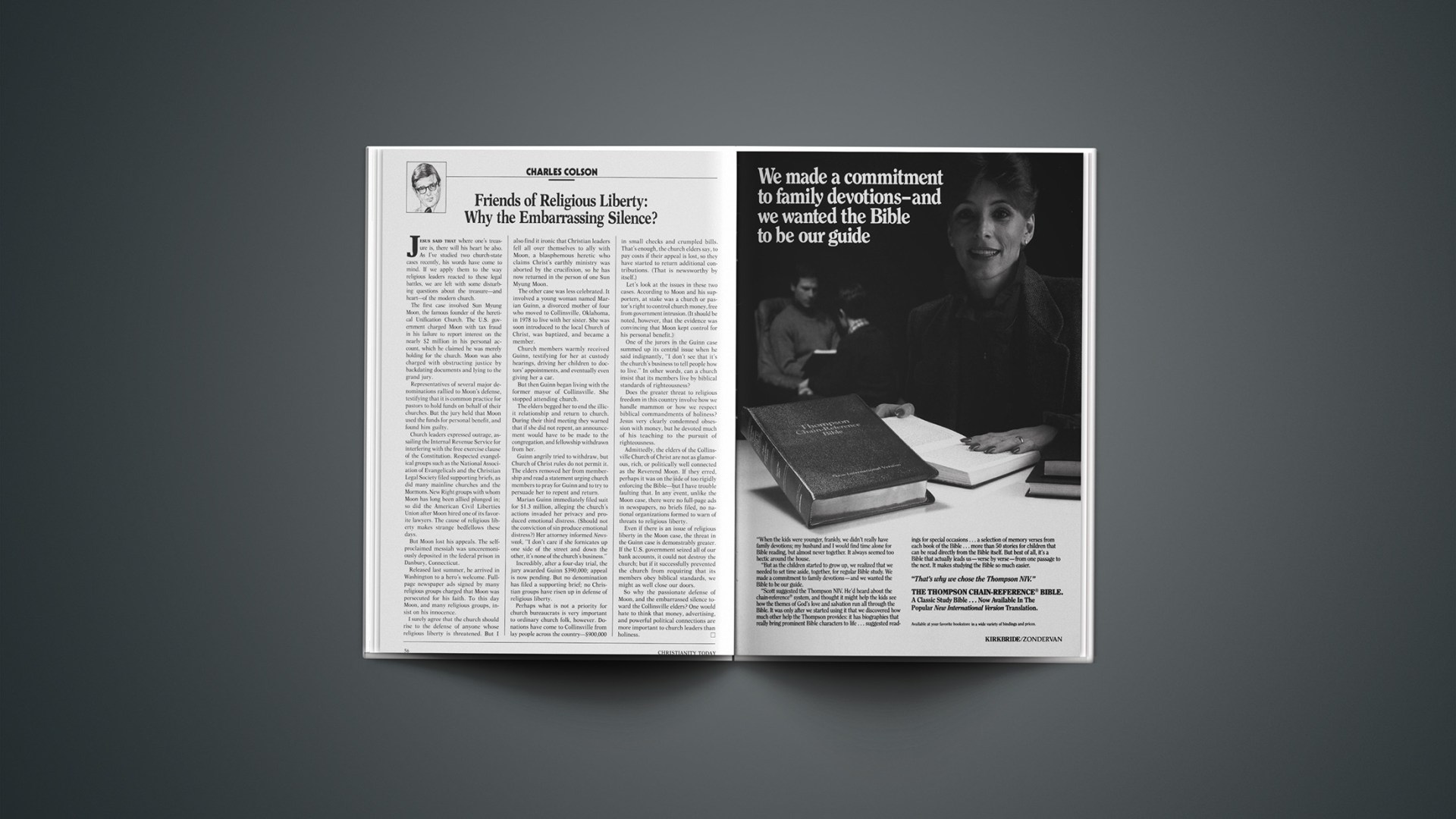Jesus said that where one’s treasure is, there will his heart be also. As I’ve studied two church-state cases recently, his words have come to mind. If we apply them to the way religious leaders reacted to these legal battles, we are left with some disturbing questions about the treasure—and heart—of the modern church.
The first case involved Sun Myung Moon, the famous founder of the heretical Unification Church. The U.S. government charged Moon with tax fraud in his failure to report interest on the nearly $2 million in his personal account, which he claimed he was merely holding for the church. Moon was also charged with obstructing justice by backdating documents and lying to the grand jury.
Representatives of several major denominations rallied to Moon’s defense, testifying that it is common practice for pastors to hold funds on behalf of their churches. But the jury held that Moon used the funds for personal benefit, and found him guilty.
Church leaders expressed outrage, assailing the Internal Revenue Service for interfering with the free exercise clause of the Constitution. Respected evangelical groups such as the National Association of Evangelicals and the Christian Legal Society filed supporting briefs, as did many mainline churches and the Mormons. New Right groups with whom Moon has long been allied plunged in; so did the American Civil Liberties Union after Moon hired one of its favorite lawyers. The cause of religious liberty makes strange bedfellows these days.
But Moon lost his appeals. The self-proclaimed messiah was unceremoniously deposited in the federal prison in Danbury, Connecticut.
Released last summer, he arrived in Washington to a hero’s welcome. Full-page newspaper ads signed by many religious groups charged that Moon was persecuted for his faith. To this day Moon, and many religious groups, insist on his innocence.
I surely agree that the church should rise to the defense of anyone whose religious liberty is threatened. But I also find it ironic that Christian leaders fell all over themselves to ally with Moon, a blasphemous heretic who claims Christ’s earthly ministry was aborted by the crucifixion, so he has now returned in the person of one Sun Myung Moon.
The other case was less celebrated. It involved a young woman named Marian Guinn, a divorced mother of four who moved to Collinsville, Oklahoma, in 1978 to live with her sister. She was soon introduced to the local Church of Christ, was baptized, and became a member.
Church members warmly received Guinn, testifying for her at custody hearings, driving her children to doctors’ appointments, and eventually even giving her a car.
But then Guinn began living with the former mayor of Collinsville. She stopped attending church.
The elders begged her to end the illicit relationship and return to church. During their third meeting they warned that if she did not repent, an announcement would have to be made to the congregation, and fellowship withdrawn from her.
Guinn angrily tried to withdraw, but Church of Christ rules do not permit it. The elders removed her from membership and read a statement urging church members to pray for Guinn and to try to persuade her to repent and return.
Marian Guinn immediately filed suit for $1.3 million, alleging the church’s actions invaded her privacy and produced emotional distress. (Should not the conviction of sin produce emotional distress?) Her attorney informed Newsweek, “I don’t care if she fornicates up one side of the street and down the other, it’s none of the church’s business.”
Incredibly, after a four-day trial, the jury awarded Guinn $390,000; appeal is now pending. But no denomination has filed a supporting brief; no Christian groups have risen up in defense of religious liberty.
Perhaps what is not a priority for church bureaucrats is very important to ordinary church folk, however. Donations have come to Collinsville from lay people across the country—$900,000 in small checks and crumpled bills. That’s enough, the church elders say, to pay costs if their appeal is lost, so they have started to return additional contributions. (That is newsworthy by itself.)
Let’s look at the issues in these two cases. According to Moon and his supporters, at stake was a church or pastor’s right to control church money, free from government intrusion. (It should be noted, however, that the evidence was convincing that Moon kept control for his personal benefit.)
One of the jurors in the Guinn case summed up its central issue when he said indignantly, “I don’t see that it’s the church’s business to tell people how to live.” In other words, can a church insist that its members live by biblical standards of righteousness?
Does the greater threat to religious freedom in this country involve how we handle mammon or how we respect biblical commandments of holiness? Jesus very clearly condemned obsession with money, but he devoted much of his teaching to the pursuit of righteousness.
Admittedly, the elders of the Collinsville Church of Christ are not as glamorous, rich, or politically well connected as the Reverend Moon. If they erred, perhaps it was on the side of too rigidly enforcing the Bible—but I have trouble faulting that. In any event, unlike the Moon case, there were no full-page ads in newspapers, no briefs filed, no national organizations formed to warn of threats to religious liberty.
Even if there is an issue of religious liberty in the Moon case, the threat in the Guinn case is demonstrably greater. If the U.S. government seized all of our bank accounts, it could not destroy the church; but if it successfully prevented the church from requiring that its members obey biblical standards, we might as well close our doors.
So why the passionate defense of Moon, and the embarrassed silence toward the Collinsville elders? One would hate to think that money, advertising, and powerful political connections are more important to church leaders than holiness.










